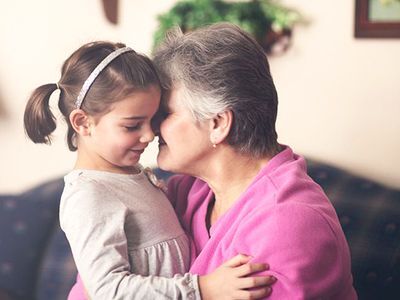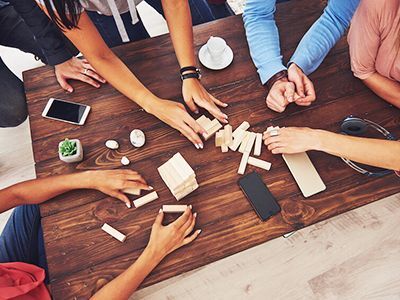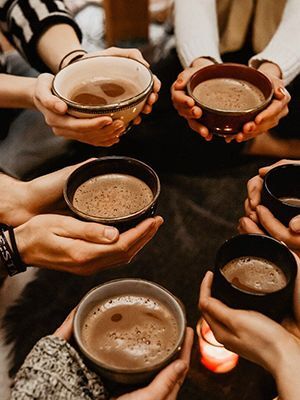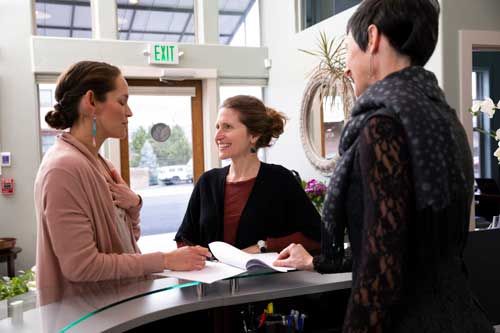Embracing Connection as a Form of Healing
authored by Taylor Appel, MSCN, RH (AHG)
Our ability to cultivate and nurture human connections can have profoundly beneficial effects on both our mental and physical well-being. Research surrounding the positive aspects of social interaction and creating meaningful relationships is unanimous. As communicated through Maslow’s “Hierarchy of Needs”, humans are social creatures with a need for deep, genuine connection, especially while experiencing stress, including healing from acute or chronic illness.1

What Genuine Connection Gives Us
As science began to further explore the importance of human connection and Maslow’s “Hierarchy of Needs”, an incredible discovery was made -- social support and meaningful connections directly impact our healing journey and can greatly benefit our quality of life. In fact, our physical and mental health are both directly impacted by social interaction and genuine human connection.
Science has demonstrated that numerous biological changes occur when we cultivate meaningful relationships, especially during times of healing or when the body is in need of additional mental, physical, or spiritual support.1 From optimizing anatomic processes like blood pressure levels and elevating our emotional well-being, to positively impacting our longevity and body mass index - positive social connections have proven to be a genuine form of medicine.
The profound impact of human connection can even be seen from our very first moments on this earth. When an infant lets out its first cry after being born, the influence of skin-to-skin, non-verbal connection provided by a mother in that moment is unmatched. This kind of intimate connection impacts both the mother and child on a biological level. It allows the mother’s breast milk to establish and flow more easily, while also providing pheromones to calm an unsettled newborn.2 Similarly as we grow and mature, meaningful connections continue to provide healing support in various biological ways.

Impact on Our Mental and Physical Health
We are biologically hardwired to seek out community, to share our thoughts with others, and we desire to feel supported in a multitude of ways. When we are lacking in meaningful connection and support, our vitality may decrease rapidly.1,3 As mentioned above, our physical, biological processes are directly impacted by the amount of connection we do or don’t experience.
Many studies highlight the impact meaningful relationships can have on the healing process and general quality of life. Some of these potential benefits include:
- Improves cancer mortality rates
- Optimizes blood sugar and pressure levels
- Decreases depression, anxiety, hopelessness, and loneliness3
- Improves PTSD symptoms
- Encourages healthy behaviors/habits4

9 Ways to Connect with Others
There are many ways we can connect with others, but when we are feeling less than ourselves while healing from an illness, it can be hard to decide what, where, and how we can cultivate some sort of human connection. Fortunately, there are many possibilities and I’ve listed some below. Your care provider, therapist, or social worker may have additional suggestions or resources to help you move through different phases, and physical or mental capacities, during your healing journey.
- Join an online/in-person support group
- Inquire about classes/events at your local community center (game nights, movie screenings, arts and crafts, etc.)
- Eat meals in communal spaces to encourage connection/conversation
- Join your local YMCA or fitness center and attend various classes
- Connect with spiritual or religious groups in your area or online
- Join a community arts center for a class or event
- Volunteer at a local food bank or other charitable activity that resonates with you
- Join a local walking, hiking, or foraging group
- Use apps like the free ‘Next Door’ to help you connect with neighbors and other locals to explore events, groups, and other activities in your area
Botanicals that Support Connection
For thousands of years and still to this day, we utilize botanical medicines for both their chemical and energetic contribution to our healing processes. Many plants possess a wide variety of constituents that directly impact the biological way our body operates, while also providing additional support to our emotional and energetic self during our healing journey. Some of my favorite botanicals to utilize while cultivating meaningful human connections include:
Rose (Rosa damascena): Rose can be utilized in a multitude of ways to support your relationship with yourself and others. Notorious for being a heart-opening flower, rose also invokes an uplifting and nostalgic feeling for many people. It helps to calm the heart, both physically and energetically, while helping to improve blood flow throughout the body. Rose often reminds us of the beautiful romance life has to offer. The fragrant perfume of roses provides a soothing action to the spirit, gently elevating the mood, and grounding the mind back into the body. Additionally, rose also offers therapeutic cardioprotective and digestive support and may help in improving general inflammatory levels as well.5 You can put fresh or dried rose petals in a tea or mix them in honey and eat on toast or cheese. Rose can also be used as a simple tincture or as a hydrosol spray to increase mood (and skin health/tone) – both forms can be found in natural food stores.

Cacao (Theobroma cacao): Similar to rose, cacao is also known for opening the heart and allowing for a more easy time connecting with yourself and others. Many cultures from around the world enjoy communal cacao ceremonies. These involve gathering with friends and community to partake of this rich chocolate drink and connect through conversation or song.
The humble cacao bean is packed with hundreds of phytochemicals that help optimize our emotional health, as well as our nutritional status. Cacao has been found to contain anti-cancer properties and can provide a wide variety of nourishing benefits. Cacao contains high amounts of iron, magnesium, antioxidants, and other essential vitamins and minerals that nourish our nervous systems and provides a fertile foundation for meaningful relationships to blossom.6 Try drinking a cup of high-quality, sustainably sourced cacao before journaling or hanging out with family or friends.
Lemon Balm (Melissa officinalis): The fragrant, lemon-scented leaves of lemon balm provide an immediate invitation to relax and rejuvenate. The volatile oils are pungent enough to calm bouts of anxiety and depression, helping to nourish the nervous system and tonify the circulatory system as well. For some people, too much social interaction can actually feel depleting - this is where lemon balm truly shines!
Lemon balm is also known to strengthen the brain and body’s resistance to stressful situations. Enjoying a glass of lemon balm tea before or after an event to sooth the social butterflies can be beneficial for restoring a sense of calm to the mind and spirit. Traditionally, and still to this day, lemon balm is commonly used as a nervine relaxant and to improve overall emotional well-being.7
It’s Time to Connect with Others
It is obvious that as humans, we are made to be a part of a greater social system, but some find this practice much easier than others. By understanding your options to cultivate connection, along with your own personal capacity for social interaction, you can begin to reap the wonderful health benefits meaningful relationships have to offer. From improving our emotional and spiritual well-being, to the physical changes that occur within our cardiovascular system and beyond - the power of genuine, human connection is a medicine that is truly unmatched.
Join the Mederi Center community by signing up for our email list! We send several emails a month with product promotions for patients, practical tips for healthy living, blogs written by our practitioners, information about events, and other news. You can unsubscribe at any time.
References
- Martino J, Pegg J, Frates EP. The Connection Prescription: Using the Power of Social Interactions and the Deep Desire for Connectedness to Empower Health and Wellness. Am J Lifestyle Med. 2015;11(6):466-475. Published 2015 Oct 7. doi:10.1177/1559827615608788
- Kalarikkal SM, Pfleghaar JL. Breastfeeding. [Updated 2023 Apr 8]. In: StatPearls [Internet]. Treasure Island (FL): StatPearls Publishing; 2023 Jan-. Available from: https://www.ncbi.nlm.nih.gov/books/NBK534767/
- Moeller RW, Seehuus M and Peisch V (2020) Emotional Intelligence, Belongingness, and Mental Health in College Students. Front. Psychol. 11:93. doi: 10.3389/fpsyg.2020.00093
- Umberson D, Crosnoe R, Reczek C. Social Relationships and Health Behavior Across Life Course. Annu Rev Sociol. 2010;36:139-157. doi:10.1146/annurev-soc-070308-120011
- Boskabady MH, Shafei MN, Saberi Z, Amini S. Pharmacological effects of rosa damascena. Iran J Basic Med Sci. 2011;14(4):295-307.
- Baharum Z, Akim AM, Hin TY, Hamid RA, Kasran R. Theobroma cacao: Review of the Extraction, Isolation, and Bioassay of Its Potential Anti-cancer Compounds. Trop Life Sci Res. 2016;27(1):21-42.
- Marciano, M., & Vizniak, N. A. (2015). Melissa officinalis. Evidence informed Botanical Medicine. essay, Professional Health Systems Inc.


